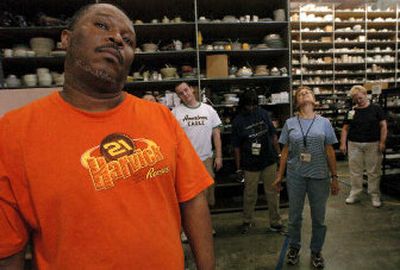Companies get firm

NEW YORK — Many companies are starting to sound like moms: They’re pushing employees to eat their vegetables and go outside and play. And they’re not being gentle about it.
Outdoor clothing company L.L. Bean, Inc. shuts down its manufacturing line three times a day for mandatory five-minute stretches, designed to prevent the most common injuries the workers suffer.
“It’s a safety measure, just as we would ask someone to wear safety glasses if there’s a danger of hurting their eyes,” said Susan Tufts, the company’s employee wellness program manager.
At retailer Replacements Ltd., 250 employees take part in a walking program organized by the company nurse. T-shirt manufacturer American Apparel has 80 loaner bikes, locks and helmets for employees and hosted an employee screening of “Fast Food Nation,” a film where the villain is the meat industry.
Insurance company The Hartford Financial Services Group Inc. is among those using price manipulation in its cafeteria to encourage employees to eat right. It’s increasing the prices on fatty foods and using the extra money to fund a subsidy for healthy sandwiches, cut fruit and salads.
Such “Twinkie taxes” are now in place at 7 to 10 percent of corporate cafeterias run by food service company Sodexho, up from almost none three years ago, according to the company.
Mounting health care costs are driving the changes. Employee assistance company ComPsych Corp. runs what it calls “trainwreck exercises,” in which companies compute how long they can absorb health care cost increases before they become unprofitable. The first client that did the exercise realized it only had 18 months. Health insurance premiums for 2006 rose 7.7 percent — twice the rate of inflation.
While some companies are responding to the higher health care cost by cutting employees’ coverage and shifting more costs to the employees, others are doing everything they can to convince employees to adopt healthier habits in the hopes they will avoid diseases caused or complicated by eating poorly and being overweight or inactive.
After L.L. Bean increased the price for burgers and lowered the price for salads in its cafeteria fruit and salad bar purchases doubled while french fry and burger sales fell by half.
When railroad company Union Pacific Corp. opened a new headquarters in Omaha two years ago it ordered its cafeteria operator to hire a full-time dietitian for the site and cut the fat and calories on every item by 10 percent.
The company runs a “Know Your Numbers” program that drills into employees’ heads figures such as the 30 minutes of exercise they should be getting a day and the 3,500 calories in a pound.
“The biggest thing the guys come back and say they learned the most about is portion size,” said Marcy Zauha, the company’s director of health and safety. “They didn’t understand how much they were eating.”